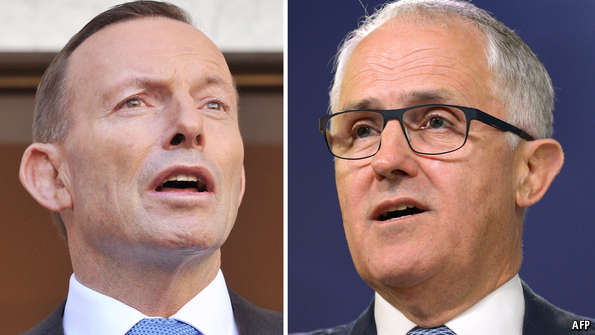A shock challenge
Australia gets a new prime minister
Malcolm Turnbull unseats Tony Abbott as Liberal Party leader
The Economist | 14 September 2015

TONY ABBOTT had described the shock in February as a “near death”
experience: just 17 months into his term as prime minister, his own
party had tried to unseat him as leader. He pleaded with his Liberal
Party to give him more time, and the party obliged.
But Mr Abbott’s time is now up. On September 14th Malcolm Turnbull
resigned as a minister in Mr Abbott’s cabinet and announced he would
challenge him for the Liberal leadership. Liberal parliamentarians later
voted on the challenge, and deposed Mr Abbott as their leader by 54
votes to 44, making Mr Turnbull Australia's new prime minister.
Mr Abbott’s leadership had looked shaky for some time. For more
than a year his conservative Liberal-National coalition government has
been trailing the opposition Labor Party in opinion polls. A poll in
early September put Labor eight points ahead, a margin strong enough to
crush the government at an election due in just a year. Mr Abbott's
combative approach and poor judgment on key issues did not appeal to
many voters. A recent survey showed 41% of Australians would prefer Mr
Turnbull as Liberal leader; a measly 15% preferred Mr Abbott.
At a press conference announcing his challenge, Mr Turnbull fiercely
attacked Mr Abbott’s capacity to lead Australia. It was clear, he
pronounced, that Australians had made up their minds about Mr Abbott’s
leadership, and that he had “not been capable of providing the economic
leadership our nation needs”. Julie Bishop, the foreign minister and the
Liberals' deputy leader, reportedly told Mr Abbott she would support Mr
Turnbull's challenge. Ms Bishop will now stay as Mr Turnbull's deputy.
The challenge was also a contest about the party’s future direction. Mr
Abbott belongs to the party’s conservative right wing; Mr Turnbull is a
liberal progressive, who supports certain issues that Mr Abbott opposes,
including gay marriage and making Australia a republic.
It is unlikely Mr Turnbull would have mounted such a bold challenge
were he not confident that opponents within his party were prepared to
accept him as leader. Backed by the party’s conservatives, Mr Abbott
unseated Mr Turnbull as Liberal leader by one vote in late 2009. Up
until now, the party’s conservatives had thwarted any ambitions Mr
Turnbull had to seize the leadership back. But enough of them switched
sides to install Mr Turnbull, apparently fearing the party could be
heading for electoral oblivion under Mr Abbott. Indeed, now that Mr
Turnbull has taken over, the Labor opposition is likely to have a more
formidable political fight on its hands at the next election than it
would have faced against Mr Abbott.


No comments:
Post a Comment